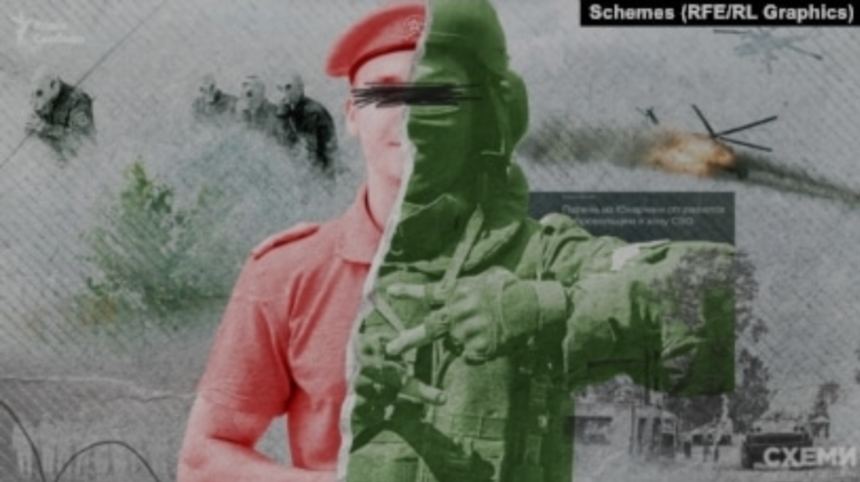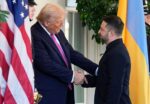Russia is using a militaristic youth organization, Yunarmia, to foster loyalty among adolescents in occupied parts of Ukraine and to prepare them to fight in Moscow’s war against their own homeland.
The development of Yunarmia amidst the large-scale occupation is evidenced by previously unpublished documents from Russian occupying authorities, obtained by the Ukrainian hacker group KibOrg and shared with Schemes, the investigative arm of RFE/RL’s Ukrainian service and its media partners.
Founded in 2016 on the initiative of then-Russian Defense Minister Sergei Shoigu, Yunarmia (the Youth Army) claims to have 1.3 million members. Children as young as 8 can join by filling out a questionnaire through a mobile app.
The organization claims to promote the spiritual, moral, social, and intellectual development of its so-called Yunarmia cadets. It also says it “creates positive motivation to fulfill constitutional duties and prepares young people for service in the Russian Armed Forces.”
In 2017, Yunarmia cadets marched alongside soldiers in the Victory Day parade on May 9th in Moscow, led by President Vladimir Putin. This year, Yunarmia children from the Russian-occupied region of Luhansk took part in military celebrations in Novosibirsk, Russia.
Russia opened the first Yunarmia branch in the occupied territories of Ukraine in Crimea just months after the organization was officially founded. By September 2016, Yunarmia had spread throughout the Crimean Peninsula, according to Oleh Okhredko, an analyst at the Almenda Center for Civic Education, a Ukrainian group that documents human rights violations in wartime.
In 2014, Russia occupied Crimea and sparked war in eastern Ukraine’s Donetsk and Luhansk regions—Donbas.
Militarized Re-Education
Yunarmia was “founded with the specific idea of militarized re-education not just for Russian children, but also for Ukrainian children from occupied territories,” said Kateryna Rashevska, a lawyer at the Regional Center for Human Rights, who was forced to flee Crimea after Russia’s occupation and now resides in Kyiv.
By January 2022, just a month before Russia invaded Ukraine, Yunarmia had 29,000 members in Crimea alone, according to Russia’s Ministry of Defense.
Ukrainian law enforcement authorities have accused the leadership of Yunarmia in occupied Crimea of violating civilian protections guaranteed by the Geneva Conventions, citing an article on “propaganda aimed at securing voluntary recruitment of civilians.”
Iryna Sedova, a human rights expert in Crimea, supports the official accusation.
“We consider the activities of this organization as violations of international humanitarian law, and the leaders of this organization are committing a war crime against the residents of Crimea, especially children and youth, whom they zombify and effectively involve unwillingly in Yunarmia,” she told RFE/RL’s Crimea.Realities in 2022.
The head of the Sevastopol branch of Yunarmia, Volodymyr Kovalenko, stated that he considered the current Ukrainian government illegitimate and denied committing any crimes.
However, since the invasion, some former Yunarmia members from occupied territories have joined the Russian military and fought in Russia’s war against Ukraine.
Among them is Illya Zozulskiy, 23, a local from Poltavka in Crimea, an artilleryman who was awarded the prestigious Zhukov Medal, according to Russian media. The Russian newspaper Mash reported in January 2023 that he was one of 50 “mentors” from Yunarmia who fought in the war.
Zozulskiy did not respond to calls or messages from Schemes and its media partners.
The UK Imposes Sanctions
The UK announced sanctions against Yunarmia on November 19, calling it a “Russian paramilitary organization playing a central role in Putin’s efforts to expel and forcibly indoctrinate the new generation of Ukrainians.” The organization is “involved in Russia’s systematic effort to erase the cultural and national identity of Ukraine.”
The sanctions announcement came amid reports that Russia’s military has recruited people from occupied Ukrainian territories for the first time.
Yunarmia itself began operating in Donbas only after Putin falsely claimed in September 2022 that the Donetsk and Luhansk regions, along with Zaporizhzhia and Kherson in the southwestern part of Ukraine, belonged to Russia. However, a similar group called the Youth Guard-Yunarmia had existed since 2019.
In 2023, Yunarmia’s “houses”—school rooms set up for firearms training and sports activities—were opened in Russian-occupied parts of Donetsk and Luhansk. According to documents obtained by KibOrg, Yunarmia uses school buildings free of charge, with the Russian federal government and Yunarmia headquarters in Moscow providing financial and other support.
The Reality in the Region
Schemes obtained from KibOrg a dozen educational records of children living in the occupied territories. Most of the listed children are either members of Yunarmia or participate in its activities.
One example is an 8th-grade student from one of the Russian-occupied cities in Donetsk, whose name is withheld to protect the privacy of the minor. According to his social media profile, he participated in a training camp called “Guardian-2024” and won a bronze medal for disassembling and reassembling an AK-74 rifle.
Participants “practiced shooting and received basic military training, studying modern tactics and methods of warfare,” his post said. It also stated that “more than 300 schoolchildren” from Russia and the Donetsk and Zaporizhzhia regions “swore allegiance to Yunarmia.”
In this war, former members of the Young Guard-Yunarmia from the occupied part of Donetsk region are fighting.
Stanislav Sikorskiy from Horlivka, who graduated high school in 2018, was a member of Yunarmia and the Young Guard-Yunarmia, according to the latter’s social media page on VKontakte. After Russia’s invasion, he was “in the ranks” of the Russian army and fought in the Kherson region, it said.
Sikorskiy was discharged from service in 2023. He did not respond to messages or calls from Schemes’ media partners.
Hanna Lisovenko, also from the Donetsk region, joined a Young Guard Yunarmia unit called “Spartans” in 2017 at the age of 17. Her social media posts show she is now fighting against Ukraine as a drone operator in a tactical military intelligence group composed mainly of fighters from Donetsk who have been involved in the war since 2014.
“I myself was in Yunarmia, and now I serve in the military. About half of those who studied with me chose the military path. Unfortunately, many of them are already dead. Some are seriously injured and unable to continue their service,” she told Schemes’ media partners. “This is the reality in our region.”
Lisovenko said that “skills in handling weapons, physical training, and history education” she acquired in the Young Guard Yunarmia proved useful in the all-out war against Ukraine.
Zozulskiy, Sikorskiy, and Lisovenko come from parts of Ukraine that have been controlled by Russia for a decade. But Yunarmia is also operating in areas occupied by Russian forces since the full-scale invasion began in 2022.
Last summer, the newly opened Mariupol branch held seven courses in a camp on the Azov Sea. Among other things, children were taught to shoot automatic rifles.
One of the camp organizers was Valeriy Onatskiy, head of the Family and Children Affairs Department of the Mariupol Occupation Administration. A 2023 investigation by Schemes revealed that Onatskiy was involved in the mass relocation, illegal deportation, and forced transfer of Ukrainian children from occupied territories to Russia—an activity that led the International Criminal Court to issue an arrest warrant for Putin on suspicion of war crimes.
In November 2022, occupation authorities said Yunarmia branches had also been established in the Russian-controlled parts of Kherson and Zaporizhzhia regions.
Fidail Bikbulatov, a Russian who heads the Yunarmia branch in Zaporizhzhia, is accused by Ukrainian intelligence of being involved in the mass abduction, illegal deportation, and forced transfer of Ukrainian children from occupied Ukrainian territories to Russia.
In comments to Schemes’ media partners, Bikbulatov said Yunarmia “wants to force its members into military service in the future.”
“We see potential in them and expect them to become soldiers,” he said. “We train them, work with them, and want them to become soldiers—the Ministry of Defense even offers benefits for former Yunarmia members if they join the military—but everything is voluntary.”
There is evidence that Yunarmia’s leadership evaluates its branches’ performance, at least in part, by the number of former members who join the Russian army.
In October, Yunarmia’s deputy head, Viktor Kaurov, sent letters to regional branches noting the mandatory “annual verification competition” and explained that the evaluation would include two parameters: “the number of those called up for military service and the tracking of Yunarmia cadets registered in military universities” and “the number of registered Yunarmia cadets in military training centers.”
The central headquarters of Yunarmia in Moscow did not respond to Schemes’ inquiries.
Source: RFE/RL







